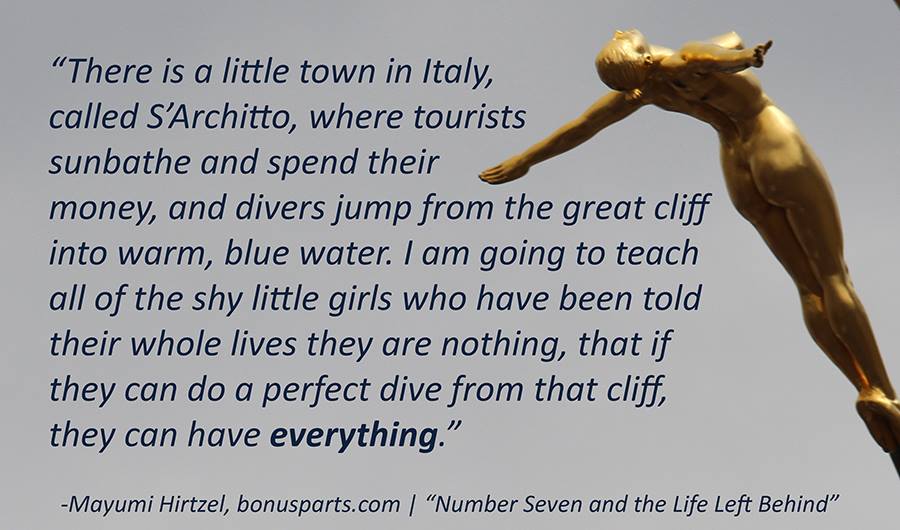by Mayumi-H | Jun 13, 2019 | Number Seven

The quote above was originally submitted for a #1LineWed offering on June 13, 2018. It comes from my original character Darya in “Number Seven and the Life Left Behind” and it gave me trouble in every single edit of the story. Every character needs their own conflict, and I wanted to give her one that was separate – and more personal – from what we witness through Number Seven’s eyes.
The backstory tidbit quoted here popped into my head in the first draft and went through surprisingly few changes before the final version. What bothers me to this day isn’t that I wrote it or that I kept it in the published novella, but whether readers understand what I was going for.
Darya’s Backstory
Darya Vikhrova is the only daughter of Ana Vikhrova, a cosmetics industry star and nouveau riche socialite. Darya’s father is unknown to her. Darya grew up amid material wealth but emotional poverty; Ana consistently told her she wasn’t worth a damn and no one would ever want her outside of her inheritance. As a little girl, Darya was withdrawn, fearful, and prone to private outbursts of anger. During a trip to Italy when she was 9 years old, Darya performed a near-perfect dive from a cliff. It changed her life. Ana’s boyfriend at the time, recognizing the feat, suggested Ana send her daughter to a professional coach. Ana and Darya were both only too happy to agree. Soon after, Darya earned a place on the national junior division team and started winning. Most importantly, she left her mother behind. Eventually, Darya would meet Kirill Morozov and his bodyguard Number Seven, and her life would change again.
In the Novella
I still don’t know if Darya’s story progression comes completely clear in the final version of “Number Seven and the Life Left Behind.” I left out a lot of the details listed above, leaving only a few lines devoted to her history, with most of them expressed by other characters, but I just didn’t want to delve too far into her backstory. She’s a secondary character at best and describing her motivations would have slowed down the main story. Still, I liked what she brought to the final product, and she was certainly fun to write! If I ever return to the world of Number Seven and his friends, I know exactly where Darya’s life will take her next.
by Mayumi-H | May 10, 2014 | Fearless, Process
On Friday, May 9, 2014, I finished the last chapter of Fearless. 167,000+ words, two-and-a-half years, and countless dreams, tears, and laughs later, it’s done. The first draft, that is. Which means it’s really just the beginning. Now, the manuscript (holy $%*&, I can really call it a manuscript!) can go to beta, then to editing, then to revision. Then, it goes to beta, editing, and revision again. I’m not sure how many passes this story will require to make it the best it can be before I die. For the moment, though, I think I’m going to take a deep breath, sit back, and let Ross and Amber rest a while. They deserve it.
I always get this happy-sad feeling when I finish a story, especially a big one. Fearless was my 2011 NaNoWriMo project, and it went through plenty of ups and downs before I typed those final words. I rather love that part of writing, though: the adventure of the first draft. It’s often imprecise and messy, but it’s full of such raw, untamed emotion! Revision requires analysis and skill, and it’s a necessary part of building a better story. It’s nothing like that rush of first draft, though. Not for me, anyway.
As an online reader, my experience is with works in progress. Friends and fellow storycrafters will post scenes or chapters as they’re made, and there’s a real sense of accomplishment to seeing a story come together organically in that way. But so many times, potential authors lose steam in their stories, and plots and characters are simply abandoned. It’s trite to say, but that makes me sad.

Clip Art by Ericlemerdy, shared via Clker
A story that is given time to grow and evolve becomes like a thing alive. When we let a story fall by the wayside, its world dies. I completely sympathize with writers or artists who start a project but then quickly realize this won’t work or that isn’t what it should be. But I really can’t understand artists who can devote huge chunks of their lives – like, years! – to a project, only to let it wither and fade when the going gets too rough or, heaven forfend, they move on to newer, shinier worlds.
I had a writer friend who told me, “Always finish the story, even if the ending is crap. You can always go back and fix it. But a finished story, no matter how crappy it is, is a real story, with a beginning, middle, and end. If you can finish, that puts you above at least half of all the other writers out there.” Now, I don’t know if his numbers were accurate, but his words have always stuck with me. And, every time I’ve started a story, I’ve wanted to make it “real”. Yes, some of the endings are crap. Some of the endings I wrote simply to get to the ending, so I wouldn’t have to look at that world any longer. But for every story I’ve written since I got that advice oh-so many years ago, I’ve given an ending. And, honestly, I think it has made me a better writer.
Now, if you’ll excuse me, I’m due for a break…at least until the next story comes calling.
What do you do when you finish a story? Do you celebrate or put your nose back to the grindstone? And, would you like to join me for a celebratory beer? (Sure, I’ll buy!)

A Schneider Aventinus poured right. Photo by bonusparts




Recent Comments
The Real Person!
Author Mayumi-H acts as a real person and passed all tests against spambots. Anti-Spam by CleanTalk.
The Real Person!
Author Mayumi-H acts as a real person and passed all tests against spambots. Anti-Spam by CleanTalk.